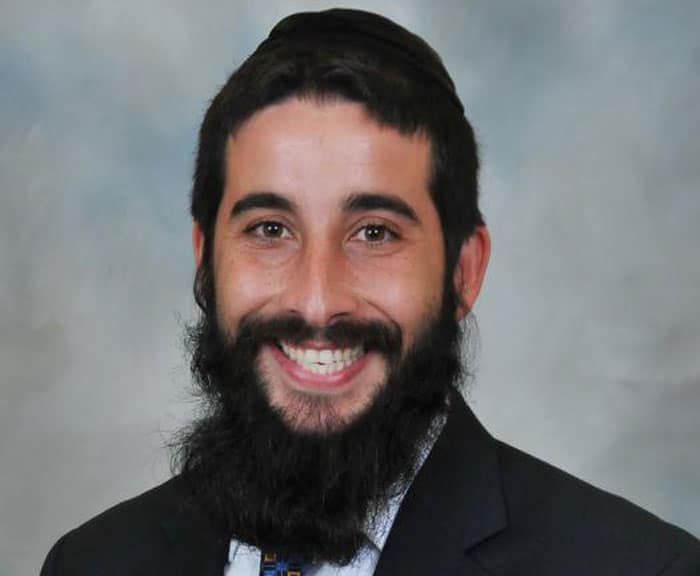
When Rabbi Arye Sufrin graduated from Yeshiva University, he had no intention to go into the rabbinate. Instead, he became an accountant at Deloitte.
But at a certain point, he felt the urge to become ordained and start working in Jewish education. He moved to Los Angeles with his wife to teach for a year at Yeshiva University High School (YULA), and thirteen years later, he’s now Head of School at YULA, Girls Division and Boys Division.
“I didn’t realize how ingrained being in Jewish education was in me,” Sufrin said. “I grew up in the home of a Jewish educator, and our Shabbos table was all about it.”
Perhaps Sufrin was always destined for greatness in the Jewish world of education. The man he was named after, his great-grandfather, grew up in a family that wasn’t religious. He started looking into Judaism and wanted to become more spiritual, but there was one problem: His family owned a store, and it was open on Shabbat.
He didn’t want to break Shabbat, so he made a deal with his parents. He wouldn’t deal with any money on Saturdays. Instead, he would sweep the floors and stock the shelves, which was technically not forbidden. He eventually inspired his parents to close the shop on Shabbat. Then, he went on to become a rabbi and start the first Chabad school in London.
“It led to our family legacy: three generations of Jewish educators, which is truly incredible and very meaningful and inspiring for me,” said Sufrin, who used to serve as assistant rabbi at Beth Jacob Congregation.
In his day-to-day work at YULA, the rabbi teaches the Torah and Talmud to his students.
“I can show them how, even though these texts are thousands of years old, they are not archaic,” he said. “It gives them the opportunity to be part of the link in the chain of our mesorah (tradition). They experience rigorous and inspiring Torah studies and general studies and see how they are synthesized and complementary to each other.”
Even with all the challenges during the past few years — lockdowns, schools and shuls transitioning to Zoom and social unrest — Sufrin said that engagement among students is higher than ever.
“We’ve seen an unbelievable commitment to growth and spirituality. They’re observant in mitzvot and striving to grow. You see the energy in class, in the halls and at a school kumzitz. It’s really special and beautiful.”
There is one issue that Sufrin said his colleagues in education across the country have experienced, however: There is a lack of people who are entering the field of Jewish education, and schools are struggling to find teachers.
“It’s the most important profession and privilege in the world to be able to educate, inspire and connect to the next generation based on our mesorah and Torah values,” he said. “It’s unfortunate that there are fewer and fewer people going into Jewish education. This is something that while we have not felt directly at YULA, this is something that the entire Jewish community across the U.S. has to focus on and make sure that there is pride so we can encourage people to go into Jewish education.”
Though there is no crisis at YULA, Sufrin is urging the community to provide Jewish educators with the support they need to continue in their field.
“We need to support our Jewish educators and express gratitude and appreciation for everything they do. Jewish educators need to be celebrated and put on the highest pedestal.“
“It’s no secret that the most successful educators in our children’s lives go above and beyond what they do in the classroom,” he said. “We need to support our Jewish educators and express gratitude and appreciation for everything they do. Jewish educators need to be celebrated and put on the highest pedestal. To me, there is no more vital and crucial job. We need to make sure we have the most talented educators inspiring our children.”
One Torah teaching that guides Sufrin in his everyday work is from Chanoch L’Naar, which says to, “Educate a child according to his way.”
“Every single student is a precious neshama (soul), and each one is on a different journey and needs to be uplifted in a way that works for them,” he said. “This is why we are blessed to have outstanding educators at YULA who are uniquely different, devoted, committed, unique and focused on the individual, whose impact relationship extends beyond the border of the four walls.”
Fast Takes with Arye Sufrin
Jewish Journal: What do you like to break the fast with after Yom Kippur?
Arye Sufrin: An egg and cheese omelet and orange juice.
JJ: What was your favorite subject in high school?
AS: In Judaic studies, it was Gemara. In general studies, math.
JJ: Do you have any inspiring thoughts on Yom Kippur to share?
AS: A beautiful idea can be learned by Kol Nidrei. Perhaps it’s not just an annulment of any swears or vows. Perhaps it’s an annulment of anything that is binding to us or that holds us back from maximizing our potential and connecting to Hashem and feeling close to God and bringing God into every moment of our lives … I think of anything that stops our growth. For some it’s technology, for some it’s being so addicted to work that you don’t have enough time for family. Everyone has those things that bind us. I try to use Kol Nidre as a reminder to annul anything that is holding me back from what’s truly important in my life — with my family, my students and my relationship with God.


































 More news and opinions than at a Shabbat dinner, right in your inbox.
More news and opinions than at a Shabbat dinner, right in your inbox.